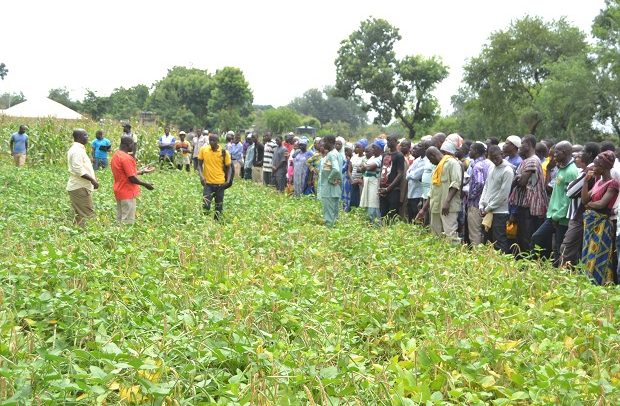A section of farmers at the demonstration farms of the improved cowpea
Scientists from the Savannah Agriculture Research Institute (SARI) under the Council for Scientific and Industrial Research (CSIR) have introduced and exposed close to 300 farmers to two improved varieties of cowpea in the Binduri and Bawku West Districts of the Upper East Region.
The beneficiary farmers are those who farm along the White Volta during the dry season as well as other farmers who lost their farm produce due to the overflow of the Black and White Volta following the recent heavy downpour and the spillage of excess water from the Bagre Dam in the Republic of Burkina Faso.
The introduction of the improved cowpea varieties namely Wan-kae and Kirkhouse Benga by SARI this season is to encourage more farmers to cultivate cowpea in the coming dry season and also to help improve food security in the two districts, especially households that lost their farm produce due to the overflow of the White and Black Volta in August and September 2018.
Every year, the spillage of extra water from the Bagre Dam in Burkina Faso causes some havoc in the Upper East and Northern Regions, especially if the water coincides with heavy downpours in these regions. This year, it has been estimated that some hundreds of hectares of farm lands and crops were submerged and destroyed and also human lives were lost.
A Senior Research Scientist of SARI in the Manga Station in the Binduri District, Dr. Francis Kusi, in an address, said the improved cowpea varieties are striga resistant and have the capacity to yield more than the existing cowpea varieties being cultivated in the two districts and across Ghana.
He said the crop had been improved to be able to withstand known diseases that affect cowpeas and also overcome some harsh weather conditions that affect the yield of the crop.
Dr. Francis Kusi was hopeful that farmers who set off early this dry season will gain more, saying, “… floods leave a lot of residual moisture at the banks of rivers and farmers can use this for profitable cowpea production without going in for any irrigation system when farming during the dry season.”
The senior scientist hinted that SARI was putting in place measures to be able to train some local farmers as community seeds producers, who will be empowered to grow and supply seeds including the improved cowpea to other farmers in the two districts and others in the Upper East Region.
Almost all farmers who spoke with DAILY GUIDE at the introduction durbar were looking forward to a good yield to cover their loss after their farms and crops were submerged by the September floods that hit the Binduri and Bawku West Districts.
They were hopeful for a very good yield, especially coming from SARI which they have been working with over the years.
A female farmer, Sophia Abugri, said: “The floods actually affected us but with the support from SARI, I am sure our lives and food security will be improved.”
The Savannah Agriculture Research Institution worked on the two cowpea varieties – Wan-kae and Kirkhouse Benga with financial support from the Kirkhouse Trust.
FROM: Ebo Bruce-Quansah, Binduri


